Faith and Politics

The World Bank is teaming up with global religious leaders in a 15-year effort to end extreme poverty by 2030.
About 35 religious groups worldwide, including Bread for the World, Islamic Relief International, the Religious Action Center of Reform Judaism, and Sojourners, endorsed the call to action. Supporters include Christians, Jews, Muslims, Baha’is, and others.
“Our approach to this staggering need must be holistic, rooted in the spiritual visions of our respective faiths, and built on a shared recognition of the intrinsic dignity and value of every life on Earth,” the call said.
Observers say it’s the first time the World Bank has tapped the reach and resources of religious groups in combating extreme poverty — partly out of a realization that the work is too big for any one institution, and also in hopes of limiting unnecessary duplication between the World Bank’s ideas and those of various religious groups.
“There’s a real convergence between these dual goals of the bank and many of the commitments and convictions of religious institutions and organizations,” said the Rev. Adam Taylor, a Sojourners and World Vision alum who now oversees faith-based initiatives at the World Bank.
During an April 9 teleconference, Wold Bank President Jim Yong Kim said the number of people living in extreme poverty — living on less than $1.25 per day — has fallen from 2 billion in 1990 to 1 billion today. And he strongly believes that with enough support, that figure could be eliminated in another 15 years.
But Kim said that in order to reach the goal, there will be two important aspects to the fight to end poverty: gathering evidence on what works and what doesn’t work in combating poverty, and enlisting the aid of religious communities.
“I believe that some of the most important leaders in the movement to end extreme poverty will be people of faith, people who are motivated fundamentally to help the most vulnerable among us,” Kim said.

Pope Francis will visit Cuba before arriving in the United States in September, the Vatican said April 22.
Rev. Federico Lombardi, Vatican spokesman, confirmed the news to reporters in a statement made in Italian, Spanish, and English.
“I am able to confirm that the Holy Father Francis, having received and accepted the invitation from the civil authorities and bishops of Cuba, has decided to pay a visit to the island before his arrival in the United States for the trip announced some time ago,” Lombardi said.
The pope is scheduled to visit Washington, New York City, and Philadelphia starting around Sept. 23.
Francis would be the third pope to visit Cuba, after St. John Paul II in 1998 and Pope Emeritus Benedict XVI in 2012.
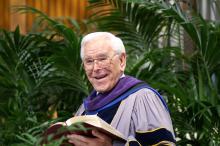
The Rev. Robert H. Schuller, the “Hour of Power” religious broadcaster, once raised $18 million to build his landmark Crystal Cathedral in Southern California’s Orange County.
Yet when he was laid to rest April 20 on the grounds of the cathedral he longer controlled, his fractured family resorted to crowdfunding to cover the costs.
“Dr. and Mrs. Schuller were left financially crippled by the loss of their retirement income previously promised by the organization,” Carol Schuller Milner, Schuller’s daughter, wrote on the site GoFundMe.
“Living on social security for the past years, they were not able to preserve a fund that would cover arrangements for funeral and memorial tributes.”
Christ Cathedral — the name the Catholic Diocese of Orange, Calif., gave the building after purchasing it in 2012 — and a private benefactor covered the funeral’s basic costs, Milner wrote.
The GoFundMe appeal seeks $30,000 to establish a website, an archive of Robert Schuller’s work, and a broadcast of the funeral.
“The funds we seek will help to give Dr. Schuller a lovely, albeit modest, goodbye,” the appeal said.
To date, a little over $6,100 has been raised from 44 donors. Individual donations have ranged from $25 to $1,000 since the campaign’s start April 11. Schuller died April 2 of esophageal cancer at the age of 88.

Amid a heated debate over his vocal opposition to homosexuality and same-sex marriage, Atlanta pastor Charles Stanley will decline an award he planned to accept from the Jewish National Fund in Atlanta on April 23.
News that the longtime pastor of First Baptist Atlanta and former president of the Southern Baptist Convention would be honored by the JNF angered many Jews who pointed to his history of vitriolic anti-gay comments.
Stanley said the award was causing too much strife within the Jewish community, and for the sake of his love for Israel, he would not accept it, according to the JNF, a nonprofit that sponsors environmental and educational programs in the Jewish state.
It was Stanley’s idea not to accept the award, JNF spokesman Adam Brill said Tuesday.
“Dr. Stanley feels that he did not want to see any further controversy and I think it’s a laudable and heartfelt decision, and we totally support and embrace it.”
Decrying Stanley’s “sordid history of virulent homophobic statements and actions,” the Southern Jewish Resource Network for Gender and Sexual Diversity (SOJOURN) led a campaign to get JNF to change its mind on bestowing Stanley with its Tree of Life award, which was to be given to him for his support for Israel by the JNF’s Atlanta chapter on Thursday, Israel’s independence day.
“We respect Dr. Charles Stanley’s decision,” said Rebecca Stapel-Wax, executive director of Atlanta-based SOJOURN, on Tuesday.
“We are so grateful for the strong support of hundreds of people across the country. We look forward to a productive dialogue with JNF in the coming weeks and building our relationship together to support the local Jewish and LGBTQ communities and Israel.”

The Supreme Court will hear arguments next week in a landmark case on gay marriage, but most Americans already have made up their minds: There’s no turning back.
In a nationwide USA Today/Suffolk University poll, those surveyed say by 51 percent to 35 percent that it’s no longer practical for the Supreme Court to ban same-sex marriages because so many states have legalized them.
One reason for a transformation in public views on the issue: close to half say they have a gay or lesbian family member or close friend who is married to someone of the same sex.
Kraig Ziegler, 58, of Flagstaff, Ariz., acknowledged being a bit uncomfortable when he attended a wedding reception for two men, friends of his wife, who had married.
“I still believe what the Bible says, ‘one man, one woman,’ ” the mechanic, who was among those polled, said in a follow-up interview.
On the other hand, he said, “I got to know the guys, and they’re all right. They don’t make passes or anything at me.”
Now he calls himself undecided on the issue.
In the survey, a majority — 51 percent 35 percent — favor allowing gay men and lesbians to marry, and those who support the idea feel more strongly about it than those who oppose it: 28 percent “strongly favor” same-sex marriage, 18 percent “strongly oppose” it. Fourteen percent are undecided.
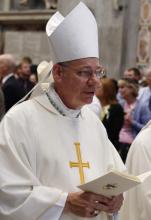
When Pope Francis accepted the resignation of Missouri Bishop Robert Finn, who was convicted three years ago for failing to report a priest suspected of child abuse, he sent a powerful message to the Catholic Church.
Here are five takeaways from the news, which the Vatican announced on April 21.
1. This is a big deal.
During the past decade, the most intense years of the Catholic Church’s long-running clergy sex abuse scandal, thousands of priests have been punished or defrocked for abusing children, and a few bishops found guilty of molestation have also quit.
But until Finn, no American bishop had ever been forced from office (despite the terse Vatican announcement that he “resigned”) for covering up for a predator priest.
That sets a precedent in an institution where many have regarded the hierarchy as a privileged caste that should not be held to the same standards as others in the church. Some feared that if a bishop were pushed out for failing to do his job, it would create a domino effect that could topple the entire superstructure.
“We all know there are other U.S. bishops wondering ‘who is the next?’” tweeted church historian Massimo Faggioli.
But Francis seems to be betting this sort of accountability at the top will strengthen the church, and even help restore the credibility of the bishops.
2. Finn was an easy case.
Finn is the only U.S. bishop ever convicted in court of failing to report a suspected abuser, the Rev. Shawn Ratigan, who was later sentenced to 50 years on federal child pornography charges.
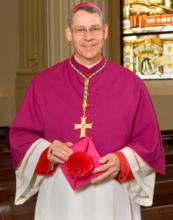
Pope Francis has accepted the resignation of an American bishop who was found guilty of failing to tell police about a suspected pedophile priest.
The Vatican on April 21 said the pope accepted the resignation of Bishop Robert Finn, who led the Diocese of Kansas City-St. Joseph, Mo.
The resignation was offered under the code of canon law that allows a bishop “who has become less able to fulfill his office because of ill health or some other grave cause” to resign.
In 2012, Finn pleaded guilty to a misdemeanor charge for failing to report suspected abuse after the Rev. Shawn Ratigan took hundreds of lewd images of children in Catholic schools and parishes.
Finn became the first U.S. bishop to be convicted in a criminal court of failing to report a suspected abuser and was sentenced to two years’ probation.
Ratigan pleaded guilty to child pornography charges and was sentenced to 50 years in prison.

Sitting under a veranda at the former headquarters of Somali Airlines, Ali Bashir sipped coffee and chewed khat, an African herb, as he recounted 15 years of anarchy fomented by al-Shabab Islamic terrorists.
“Life is very hard here,” he lamented.
“There’s nothing to eat and nowhere to work. But the rebels will come and still ask you for money.”
Since Somalia’s central government collapsed in the early 1990s, al-Shabab has emerged as the greatest threat to international efforts to rebuild the east African nation. The al-Qaida-linked militants extort, kidnap, stage terror attacks, and control remote areas of the countryside.
Al-Shabab gained renewed global attention last week, when a small band of militants massacred 148 people at Garissa University College in neighboring Kenya, where they singled out Christians for execution. In 2013, al-Shabab terrorists attacked the Westgate Mall in Nairobi, Kenya, murdering nearly 70.
In the wake of this month’s attack, Somalia President Hassan Sheikh Mohamud called for more cooperation between Kenya and Somalia to eliminate al-Shabab, and Kenyan jets pounded two al-Shabab camps in Somalia.
Bashir, 28, who sold clothing before fleeing here, doubted the Somali government could do much about the terrorist group. He fled to the capital here a few years ago after al-Shabab seized control of a region in the south. He now lives in the old airlines headquarters with 1,000 other families.
“I have grown up in this country without knowing peace or stability,” said Bashir, a father of six.
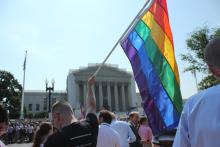
State bans on same-sex marriage have been justified based on judicial precedent, states’ rights, regulating procreation, optimal child-rearing, and centuries-old tradition. Those reasons also have been loudly debunked.
When it convenes April 28 for one of the most historic oral arguments in its 226-year history, the Supreme Court will hear all of those arguments and more from five lawyers representing gays and lesbians on one side, and the states of Kentucky, Michigan, Ohio, and Tennessee on the other. But the justices also will have read what dozens of federal trial and appeals court judges have written.
Here’s a look at five major arguments cited by those appeals court judges in their rulings. In addition to the four Midwest states whose bans were upheld, the circuit courts struck down similar bans in Idaho, Indiana, Nevada, Oklahoma, Utah, Virginia, and Wisconsin.
1. Judicial Precedent
The first hurdle in the gay marriage debate facing lower court judges has been what to make of a 1972 Supreme Court ruling that denied marriage rights to a gay couple in Minnesota.
The one-line summary decision in Baker v. Nelson upheld the state’s ban on same-sex marriage “for want of a substantial federal question.” At the time, marriage was seen as the exclusive purview of the states.
Because of the wealth of judicial rulings that have come in the following four decades, most federal judges have reasoned that Baker does not tie their hands.
“Since Baker, the court has meaningfully altered the way it views both sex and sexual orientation through the equal protection lens,” the U.S. Court of Appeals for the 4th Circuit ruled in the Virginia case, Bostic v. Schaefer. The panel’s majority noted that the justices did not even mention the 1972 case when they struck down a key section of the federal Defense of Marriage Act in 2013.
In the case of Obergefell v. Hodges now before the Supreme Court, however, Judge Jeffrey Sutton of the U.S. Court of Appeals for the 6th Circuit differed with all the previous rulings.
“This type of summary decision, it is true, does not bind the Supreme Court in later cases,” he wrote for his panel’s 2-1 majority.
“But it does confine lower federal courts in later cases.”
2. State's Rights

More than a dozen states, plus the District of Columbia, are considering controversial medically assisted death legislation this year.
The laws would allow mentally fit, terminally ill patients age 18 and older, whose doctors say they have six months or less to live, to request lethal drugs.
Oregon was the first state to implement its Death with Dignity Act in 1997 after voters approved the law in 1994, and four other states — Montana, New Mexico, Vermont, and Washington — now allow for medically assisted death.
As of April 10, at least another 25 states have considered death with dignity bills, according to Compassion & Choices, a Denver-based nonprofit organization that advocates for these laws. Some of those bills already have died in committee.
“The movement has reached a threshold where it is unstoppable,” said President Barbara Coombs of Compassion & Choices, who was also chief petitioner for the Oregon Death with Dignity Act.
The issue of medically assisted death rose to prominence last year with the case of Brittany Maynard, 29, who was told she had six months to live after being diagnosed with brain cancer. Maynard was a strong advocate for Death with Dignity, and when she learned of her grim prognosis, she moved from her home state of California to Oregon where terminally ill patients are allowed to end their own lives.
“I would not tell anyone else that he or she should choose death with dignity,” she wrote in an op-ed on CNN.com.
“My question is: Who has the right to tell me that I don’t deserve this choice? That I deserve to suffer for weeks or months in tremendous amounts of physical and emotional pain? Why should anyone have the right to make that choice for me?”

Controversial American author Ayaan Hirsi Ali has been a regular fixture on major news networks lately, discussing her most recent book, Heretic, as well as her views on various issues that include violence in Islam and the treatment of Muslim women.
An ex-Muslim, Hirsi Ali began her rise to fame with her book Infidel, which documented her hardships growing up as a Muslim woman in her native Somalia. In light of her turbulent past, Hirsi Ali has gained strong following in the West. Prominent atheist author Richard Dawkins has called her a “hero for rationalism and feminism.” Now, after the release of Heretic, some are again cheering her as a brave champion for women’s rights, especially for Muslim women.
While many in the West have been receptive to her case, Hirsi Ali’s vicious attacks on Islam and her support for the war on terror, fought mainly in Muslim countries , have left her with few friends among Muslims, including women. Hirsi Ali once famously called Islam a “nihilistic cult of death,” and she has advocated for a war with Islam.
Many examples of brave Muslim women exist in the Muslim world, yet it is not surprising that Hirsi Ali, regardless of her dangerous assertions, has stolen the limelight. As the American government continues to indulge in the war on terror, Hirsi Ali’s story makes her the perfect candidate to provide validation for the atrocities committed by the U.S., from Somalia to Pakistan.
The war on terror is largely a bipartisan issue. But media personalities, especially neoconservatives, have rushed to Hirsi Ali’s defense . Seemingly ever ready for war in the post-9/11 era, they look to Hirsi Ali’s views to help legitimize their own anti-Islam bias and imperialist ambitions.
It is no surprise, then, that she is a fellow at the American Enterprise Institute, which has consistently tried to foster antagonistic relations between the U.S. and the Muslim world.
The liberal media, which have provided a more balanced view on Islam, also sympathize with Hirsi Ali’s detrimental views, especially in its simplistic portrayals of women in the Islamic world.

African-American women of faith joined other women and political leaders in a “pray-in” on April 15 to call on Republicans to quit delaying the confirmation of attorney general nominee Loretta Lynch.
“We’re standing before dead ears and asking you to open them up right now, God, that they might hear you,” prayed the Rev. Barbara Williams-Skinner , co-chair of the National African American Clergy Network.
“That they would wake up now from a dead sleep, unaware that America, Americans of all types and backgrounds, are united behind the fundamental concept of fairness.”
President Obama nominated Lynch, the U.S. attorney for the Eastern District of New York, in November, but her confirmation process has stalled on Capitol Hill.
In addition to prayers, the women leaders said they will start fasting until a decision is made, and they invited women of all backgrounds as well as men to fast, too. They are joining with the Rev. Al Sharpton’s National Action Network in a “ Confirm Lynch Fast .”
NAN Executive Director Janaye Ingram asked that participants contact Senate offices when they normally would be eating. Fasters were expected to abstain from food one day at a time and be replaced by others the next day.
Several congresswomen, including Democratic House Judiciary Committee members Reps. Sheila Jackson Lee of Texas and Judy Chu of California, stopped by the pray-in, and at least one pledged to fast.
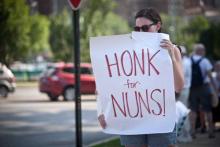
The Vatican on April 16 officially ended a controversial investigation of American nuns with a face-saving compromise that allows Pope Francis to close the book on one of the more troubled episodes from the pontificate of his predecessor, Benedict XVI.
“We are pleased at the completion of the (investigation), which involved long and challenging exchanges of our understandings of and perspectives on critical matters of religious life and its practice,” Sister Sharon Holland, president of the leadership network of nuns that had been under investigation, said in a statement released following a meeting in Rome with the Vatican’s top doctrinal officials.
“Through these exchanges, conducted always in a spirit of prayer and mutual respect, we were brought to deeper understandings of one another’s experiences, roles, responsibilities, and hopes for the church and the people it serves,” said Holland.
“We learned that what we hold in common is much greater than any of our differences.”
A brief statement from Cardinal Gerhard Mueller, head of the Congregation for the Doctrine of the Faith and leader of the effort to rein in the nuns, who were seen as too liberal, shed little light on what the long-running investigation achieved and seemed aimed at moving past the contentious saga.
Mueller said he was confident that the mission of the nuns “is rooted in the Tradition of the Church” and that they are “essential for the flourishing of religious life in the Church.” The original report had accused the nuns of promoting “certain radical feminist themes incompatible with the Catholic faith.”
In another indicator of the thaw in relations, the delegation of American nuns met later on April 16 with Francis for 50 minutes in a warm encounter that seemed to underscore the sisters’ affinity for the pope’s focus on social justice and on pastoral outreach to the world.
“Our conversation allowed us to personally thank Pope Francis for providing leadership and a vision that has captivated our hearts and emboldened us as in our own mission and service to the church,” the nuns said in a statement.
“We were also deeply heartened by Pope Francis’ expression of appreciation for the witness given by Catholic sisters through our lives and ministry and will bring that message back to our members.”

Canada’s Supreme Court has ruled that a small town in Quebec may not open its council meetings with prayer.
In a unanimous ruling April 15, Canada’s highest court ruled that the town of Saguenay can no longer publicly recite a Catholic prayer because it infringes on freedom of conscience and religion.
The case dates back to 2007, when a resident of Saguenay complained about public prayer at City Hall.
Just last year, a divided U.S. Supreme Court ruled that legislative bodies such as city councils could begin their meetings with prayer, even if it plainly favors a specific religion.
But the Canadian high court ruled that the country’s social mores have “given rise to a concept of neutrality according to which the state must not interfere in religion and beliefs. The state must instead remain neutral in this regard. This neutrality requires that the state neither favor nor hinder any particular belief, and the same holds true for non belief.”
The court said a nondenominational prayer is still religious in nature and would exclude nonbelievers.

Jeb Bush will deliver the commencement address at Liberty University on May 9, becoming the second GOP presidential contender to speak at the Christian school this year.
“Throughout his years of public service, Governor Bush has been a champion of excellence in education and so many other issues of vital importance to our university community,” President Jerry Falwell Jr. said in a statement about the college’s 42nd commencement exercises.
Bush, a former Florida governor, has all but declared he will seek the GOP presidential nomination in 2016. Sen. Ted Cruz of Texas was the first Republican to formally enter the field, and kicked off his campaign with a speech at Liberty’s convocation on March 23.

Christian ministers should establish relationships with law enforcement, seek ways to become moral authorities in their communities, and listen.
Those were the top recommendations from experts at a panel sponsored by The Gospel Coalition on April 14 titled “Seeking Justice and Mercy From Ferguson to New York.”
The popular ministry offered an alternative approach to that of evangelist Franklin Graham, who was widely criticized for his recent “Obey the police, or else” comments on Facebook. The comments followed the spate of police killings of unarmed black men.
In response to that Facebook post, 31 African-American, Hispanic and Asian-American leaders, many of them evangelicals, signed an open letter to Graham, saying he revealed a lack of empathy and understanding of the justice system.
At the April 14 panel, pastor and former public defender Ed Copeland; music producer and Filipino film and TV actor Alex Medina; Sanford, Fla., Police Chief Cecil Smith; and U.S. Attorney Robert Lang offered tips to help ministers and other church leaders become “ministers of reconciliation.”

The number of violent anti-Semitic attacks around the world surged nearly 40 percent last year, according to a report released April 15 by researchers at Tel Aviv University in Israel.
The report found there were 766 recorded incidents against Jewish people in 2014 — the worst year for attacks since 2009. It was released ahead of Israel commemorating Holocaust Remembrance Day, which began April 15 at sundown.
The attacks were “perpetrated with or without weapons and by arson, vandalism, or direct threats against Jewish persons or institutions such as synagogues, community centers, schools, cemeteries, and monuments as well as private property,” the authors of the report, based at the Kantor Center at Tel Aviv University, said.
In 2013, there were 554 registered incidents.

The Vatican is set to host a major conference on climate change this month that will feature leading researchers on global warming and an opening address by U.N. Secretary-General Ban Ki-moon.
The meeting, which the Vatican detailed on its website late on April 14, is another sign of Pope Francis’ “green agenda” and another potential red flag for conservatives who are already alarmed over an expected papal teaching document on the environment that is scheduled for release this summer.
The one-day summit on April 28 will also include participants from major world religions and aims to “elevate the debate on the moral dimensions of protecting the environment in advance of the papal encyclical,” as the papal document is known.
Another goal, says a statement on a Vatican website, is to highlight “the intrinsic connection between respect for the environment and respect for people — especially the poor, the excluded, victims of human trafficking and modern slavery, children, and future generations.”

Less than two weeks after a third-grade teacher in Duncan, Okla., distributed Gideon Bibles to her students, the Church of Ahriman, a Satanist church in Oklahoma City, has asked permission to distribute Satanist literature at Woodrow Wilson Elementary School.
Adam Daniels, the church’s leader, said he wanted to give students a copy of Ahrimani Enlightenment, a primer and workbook normally given to new members of the church.
In a letter to the Duncan school district, some 80 miles south of Oklahoma City, Daniels assured administrators that his book is “no where (sic) near as graphic as the Christian Bible.”
Daniels said he has yet to hear back, but he believes equal access laws mean that his church has the right to distribute literature if other religious organizations are permitted to do so.

The limiting of religious freedom is a perpetually contested question in American public life. Most recently, as states consider new laws and the U.S. Supreme Court prepares to rule on same-sex marriage, gay rights supporters and traditionalist Christians appear to be on a collision course.
To make matters worse, whenever disputes between gay couples and conservative Christian wedding vendors arise, a well-funded professional grievance industry sends lawyers and media handlers out to convince the public that this is the great civil rights issue of our time.
As a new prevailing cultural consensus on homosexuality displaces a former one, it remains to be seen how the winners will treat the losers. From laws that impose punitive fines to rhetoric that places “religious liberty” in quotation marks so as to diminish it, the culture war’s apparent victors have not accorded religious freedom its due place of prominence in our public life.
The present tension between religious liberty and LGBT rights is unsustainable, but it is not insurmountable. Activists on both sides have been short on empathy for each other. Leaders have every incentive to portray their opponents as evil retrogrades hellbent on destroying society.